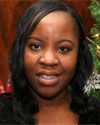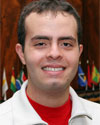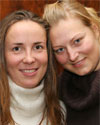From eggnog, to turkey dinner, to late-night viewings of TV classics such as A Christmas Carol and It’s a Wonderful Life, everyone has their favourite holiday traditions. The International Student and Exchange Services (ISES) held a festive open house recently to celebrate the season. We asked students from around the world about the songs, foods, and activities that make the holidays special for them.
 | “Our holiday traditions are basically not really different from North American traditions. We have turkey dinner, people go to church and Christmas parties, and just enjoy spending the holidays together,” she says. “One of the traditional dishes that we serve is called nshima, which is maize meal that is boiled and eaten with beef or chicken stew.” — Beene Buleze, Zambia |
 | “In Colombia, we have Novena, which we celebrate for nine days leading up to Christmas eve. During Novena, we pray and go to a different friend or relative’s house. It’s really fun, like a different party every day. We serve dishes like bunuelos, which is like a salty cupcake, and natillas, which is a pudding that is very sweet.” — Catalina Gomez, Colombia |
 | “My holiday traditions depend on where I am! I grew up in India, but my family moved to Abu-Dhabi. If I’m in India, the celebrations are bigger and more public. We are Catholic, so we’d go to Mass, and sing traditional Christmas songs, but in our Konkani language. If I’m in Abu Dabi, the celebrations are a quieter, not as public.” — Shaun Correa, India/Abu-Dhabi |
 | “Christmas is in the summertime for us, so the holidays might mean going to the beach! We have Santa Claus, but we call him Papai Noel, which means Christmas Daddy or Christmas Father. It’s a fairly religious country, so it’s very common to see politicians wishing a Merry Christmas on television, quoting passages from the Bible, or telling stories about the birth of Christ.” — Gilberto De Melo, Brazil |
 | In Denmark, we celebrate the four Sundays of Advent by lighting a candle on the Advent Wreath. Children discover treats as they open the doors on their Advent calendars each morning in December. A traditional dish that we serve is ris a l’amande – like a rice pudding. We also put Danish flags on the Christmas tree.” |
 | Muslims celebrate what's called "Eid Al-Adha" which, in Arabic, translates into the sacrificial feast or celebration. This commemorates the covenant that the prophet Ibrahim (Abraham) made with God when he showed his faith by almost sacrificing his son Ismael (Ishmael). God stopped the sacrifice and it ended with a sacrifice of a lamb instead. The story is different within Judeo-Christian culture because it was Isaac who was almost sacrificed. Muslims celebrate Eid Al-Adha by slaughtering livestock (mostly sheep and goats) and sharing the meat between them in feasts and giving also part of the meat as well as money to the needy. The charity reaches Muslims worldwide through many organizations. It is also the time for "hajj." This pilgrimage is the travel to Mecca to visit the "Kaaba" or the cube and doing the rituals and prayers required there. Since we live in a newly globalized era, there are many who celebrate the holiday the "secular way," just like how most people celebrate Christmas here. There is less focus on the spirituality and more focus on taking a vacation, shopping and partying. In terms of food, each culture/country has its own flavour. What is common among Muslims is that they prefer to eat lamb on this occasion and in general they like their meat to be "Halal," which is the Arabic word for permissible or allowed. This indicates that the meat was slaughtered by the cutting of the neck, and the draining of the blood of the animal, while intending the slaughter for the sake of Gob by reciting directly before the slaughter "Bism-Allah Al-Rahman Al-Raheem" which translates into "In the name of God The Most Gracious and The Most Merciful." This celebration changes every year because Muslims (as well as Jews) follow a lunar calendar, that is not in sync with the Gregorian, or solar calendar. |
Ã˝Ã˝Ã˝Open your homeWould you like to share your holiday traditions with an international student? Consider hosting a student this holiday season for a cross-cultural exchange of ideas and friendship. Volunteers with this ISES program agree to provide a ‚Äòhome away from home‚Äô for an international student during the holiday season. Share a meal, or some other holiday activity, like a concert or cultural event. Students will experience your holiday traditions, and you will gain a deeper understanding about a country and culture different from your own. For further details, please contact International Student Exchange Office at 494-1566 or email at ises@dal.ca. |
